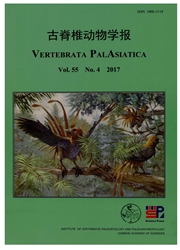

 中文摘要:
中文摘要:
记述了弓鳍鱼亚科一新种:Cyclurus orientalis(东方圆尾鱼),标本采集于中国湖南省湘乡市下湾铺早始新世至中始新世下湾铺组。化石因具有以下特征而被归入弓鳍鱼亚科(Ami—inae):尾前椎为双椎型;除第一尾椎和第一尾下骨外,其余尾椎和尾下骨均一对一愈合;无膜质尾骨;背鳍长。冈其第一冠状骨上的牙齿顶端圆钝,而被归入Cyclurus属。本新种与Cyclurus属中其他种的区别在于:背鳍鳍条较少;身体短而高;脊椎和椎体较少。在始新世淡水鱼类的跨太平洋分布达到鼎盛时,由于弓鳍鱼亚科并非仅分布于太平洋两岸的类群,因此不能作为跨太平洋分布的指示类群。弓鳍鱼亚科在北半球的分布范围更广,与某些其他淡水鱼类群例如狗鱼科(Esocidae)和骨舌鱼科(Osteoglossidae)相似,这种现象只能用有别于形成跨太平洋分布的地质背景来解释。
 英文摘要:
英文摘要:
Described in this paper is a new amiine, Cyclurus orientaliz, collected from the early to middle Eocene Xiawanpu Formation of Xiawanpu, Xiangxiang City, Hunan Province, China. It is unquestionably an amiine because of the diplospondylous vertebrae of both the normal and alternating types in its preural caudal region, the one-to-one fusion between the ural centra, except the first one, and the hypurals, the absence of the urodermals in the caudal skeleton, and the long dorsal fin. It is referred to Cyclurus because its first coronoid carries teeth with rounded tops. It is different from other species of Cyclurus in having fewer dorsal fin rays, deeper and shorter body, and fewer vertebrae and centra. During the Eocene when the transpacific distribution pattern reached its maximum, amiines were not uniquely shared by both sides of the Pacific and thus cannot be taken as an indicator of the transpaeific distribution. Their wider, northern hemisphere distribution, along with the similar distribution of some other fish groups such as Esoeidae and Osteoglossidae, may call for an alternative explanation by other special geological backgrounds.
 同期刊论文项目
同期刊论文项目
 同项目期刊论文
同项目期刊论文
 Population differentiation of Procypris rabaudi (Tchang) in the upper reaches of the Yangtze River r
Population differentiation of Procypris rabaudi (Tchang) in the upper reaches of the Yangtze River r Population genetic structure of an endemic Cyprinid fish, Ancherythroculter nigrocauda, in the Upper
Population genetic structure of an endemic Cyprinid fish, Ancherythroculter nigrocauda, in the Upper Redescription of ?Cobitis longipectoralis Zhou, 1992 (Cypriniformes: Cobitidae) from late early Mioc
Redescription of ?Cobitis longipectoralis Zhou, 1992 (Cypriniformes: Cobitidae) from late early Mioc Multiple In-to-Africa dispersals of labeonin fishes (Teleostei: Cyprinidae) revealed by molecular ph
Multiple In-to-Africa dispersals of labeonin fishes (Teleostei: Cyprinidae) revealed by molecular ph The phylogenetic relationships of the Gobioninae (Teleostei: Cyprinidae) inferred from mitochondrial
The phylogenetic relationships of the Gobioninae (Teleostei: Cyprinidae) inferred from mitochondrial Redescription of Paralycoptera wui Chang & Chou 1977 (Teleostei: Osteoglossoidei) from Early Cretace
Redescription of Paralycoptera wui Chang & Chou 1977 (Teleostei: Osteoglossoidei) from Early Cretace Acheilognathus striatus (Teleostei: Cyprinidae), a new bitterling species from the lower Yangtze Riv
Acheilognathus striatus (Teleostei: Cyprinidae), a new bitterling species from the lower Yangtze Riv Extraordinarily thick-boned fish linked to the aridification of the Qaidam Basin (northern Tibetan P
Extraordinarily thick-boned fish linked to the aridification of the Qaidam Basin (northern Tibetan P Evidence of host specificity and congruence between phylogenies of bitterling and freshwater mussels
Evidence of host specificity and congruence between phylogenies of bitterling and freshwater mussels Isolation and characterization of 11 polymorphic microsatellite loci for the Saurogobio dabryi (Tele
Isolation and characterization of 11 polymorphic microsatellite loci for the Saurogobio dabryi (Tele Comparasion of evolution rates in the mitochondrial DNA cytochrome b gene and Control region and the
Comparasion of evolution rates in the mitochondrial DNA cytochrome b gene and Control region and the Estimated evolutionary tempo of East Asian gobionid fishes (Teleostei: Cyprinidae) from mitochondria
Estimated evolutionary tempo of East Asian gobionid fishes (Teleostei: Cyprinidae) from mitochondria A new Eocene catostomid (Teleostei: Cypriniformes) from northeastern China and early divergence of C
A new Eocene catostomid (Teleostei: Cypriniformes) from northeastern China and early divergence of C Pliocene cyprinids (Cypriniformes, Teleostei) from Kunlun Pass Basin, Northeastern Tibetan Plateau a
Pliocene cyprinids (Cypriniformes, Teleostei) from Kunlun Pass Basin, Northeastern Tibetan Plateau a 期刊信息
期刊信息
